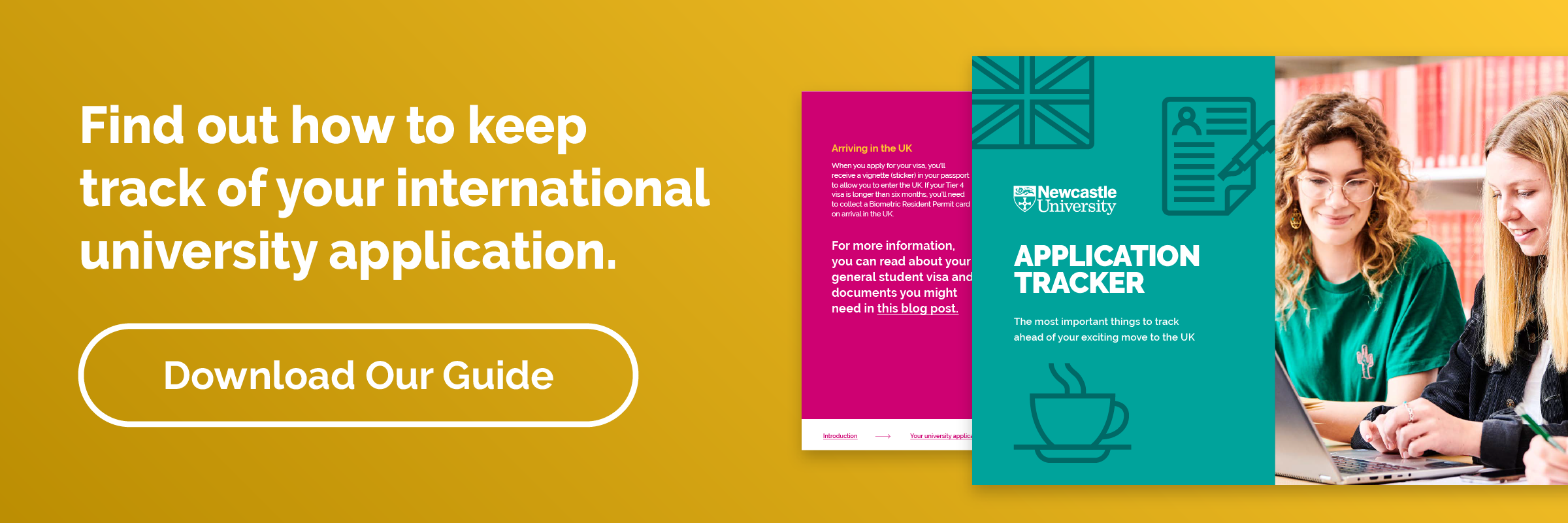This is where your exciting UK university journey begins. Entering the details and submitting your university application is one of the most important steps to take. Taking time to make sure everything is correct might mean you receive an offer from your ideal university.
To attend a UK university, you’ll need to submit your application through UCAS. This is an organisation whose main role is to operate the application process for all UK universities. To help you get started, we’ve outlined what’s involved in a university application in this blog.
- Search for courses and select universities
- Include your address (and let UCAS know of any changes!)
- Add your predicted exam results
- Don’t forget your choice of courses and universities
- Submit the best personal statement possible
- Waiting to hear back…
- Replying to your offers
- Find out if you have your place

Search for courses and select universities
You can either find the course you want to study through the UCAS search tool or directly through a university website. Here, you should check the entry requirements and the deadlines to submit your application.
In your UCAS application, you can apply to five different universities. If you’re applying to study at Newcastle University, then the institution name to look out for is NEWC and the institution code is N21.
Include your address (and let UCAS know of any changes!)
This is simple but really important. When you begin your application, make sure to add your current living address. If your address changes - including your email address or even your contact number - then make sure to tell UCAS so they can update their records.
UCAS automatically notifies the universities of any changes. This is important because the majority of communication from universities is usually by email, such as reminders, news and even your offer!
Add your predicted exam results
Write down all of the exams you’re either doing right now or you will be doing soon. Make sure you get the names and details of the exam correct so that your application can be checked properly.
Although universities don’t just base their decisions on exam results alone, it can help them with their decision. Plus, it can stop any delays.
Another tip here is not to be tempted to give the UK equivalent of your grades. UK universities need to know exactly which exams you’re doing, and your existing and predicted results. They’ll decide on the equivalents themselves to avoid confusion.
Don’t forget your choice of courses and universities
If you’re submitting your university application, you should already have a good idea of the courses you want to study. You’re allowed five choices but you don’t have to use them all. If you’re applying to study medicine, dentistry or veterinary science, then you’re only allowed to use four choices.
Don’t worry, each university you apply to can only see its own application. So, if you've sent an application to Newcastle University, other universities won't be able to see that you've applied here. They also can’t see if all of the courses in your application are the same.
You’ll also need a reference from a teacher, adviser or professional who knows you academically. Try and give them notice beforehand so they have time to check it in detail.
Submit the best personal statement possible
A useful tip here is to prepare your application early. This is so that you have plenty of time to draft up an amazing personal statement where you can express yourself. Universities also look at personal statements when deciding on who to offer a place.
It’s a chance to persuade universities that yours is the best application they’ll read and you're the applicant they should offer a place to. Some things you might want to add in your personal statement include:
- relevant personal information about yourself
- why you want to study your chosen subject
- what particular qualities and experience you bring to the course
- details of any work experience or voluntary work you’ve done
- your career aspirations and goals
You can only submit one personal statement. So if your courses are varied, you’ll need to try and show passion and enthusiasm for all of them equally. Once you’re ready to submit your application, it’s a good idea to have someone else do one final check to make sure everything makes sense.
You’ll need to be ready to make the payment too. Although the figures can change each year, you’ll need to pay around £18 for a single choice application or around £24 for more than one choice.
To stay up to date with everything about applying to Newcastle University through UCAS, click here for an overview. That’s all there is to know about a university application, but here’s some more useful information you should know about the next steps.
Waiting to hear back…
After you’ve submitted your application, the universities you’ve applied to will decide whether to make you an offer or not. It can either be:
- a conditional offer which is based on your exam results
- an unconditional offer if you’ve already met the entry requirements
Replying to your offers
Once the universities have made their decision, it’s your turn to reply to the offers by the deadline.
- Select a firm choice - this is your first choice and the university you want to attend the most
- Insurance choice - if your firm choice is conditional, then select an insurance choice too. This is an optional back-up choice
- Decline - once you’ve made your decisions, you can decline the offers from the universities you don’t want to attend
The final step is to check if you’ve got your place. All you need to do is check your UCAS account to see if your place has been confirmed. A university application is one of the four main things you need to track, so it’s the perfect time to look at the others you need to know about…
What else you need to track before attending a UK university
The UK is packed full of amazing culture, diversity and world-class facilities where you’ll earn a respected degree. Your Newcastle University application is just one of four important parts - the others are your finances, student visa and your accommodation.
To help, we’ve created a free application tracker. It features plenty of information on each application to help you stay one step ahead. To get your free copy, click on the link below.
